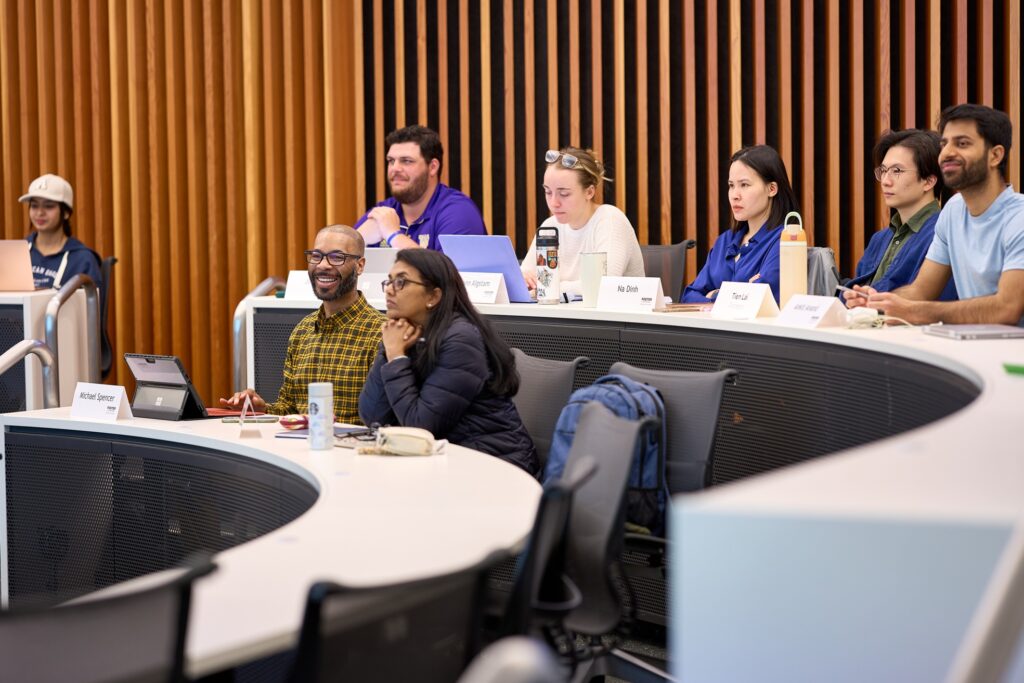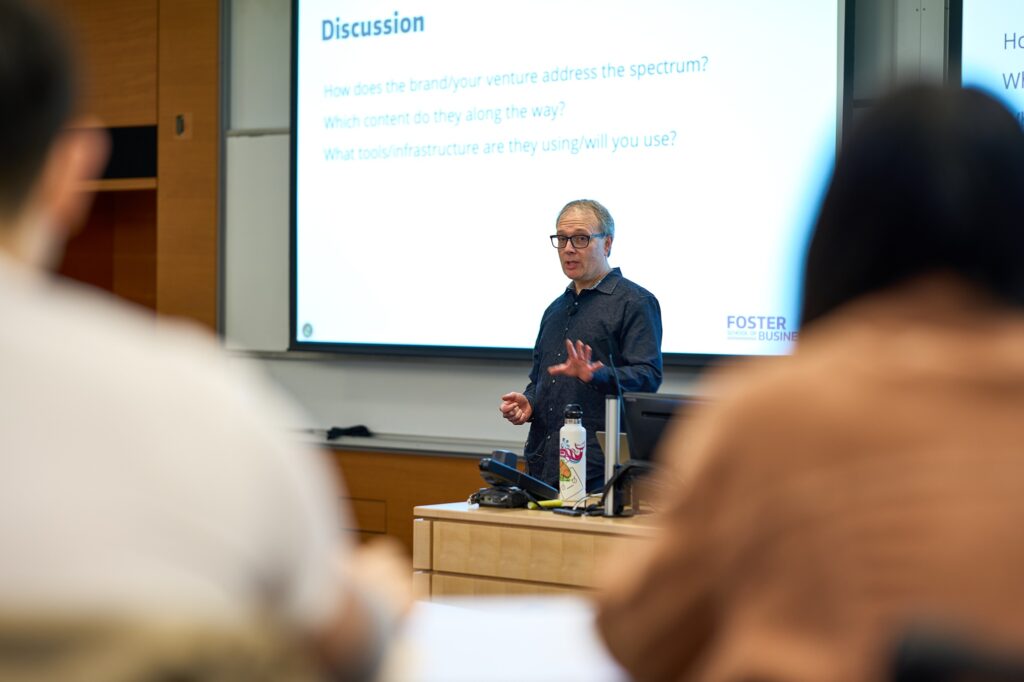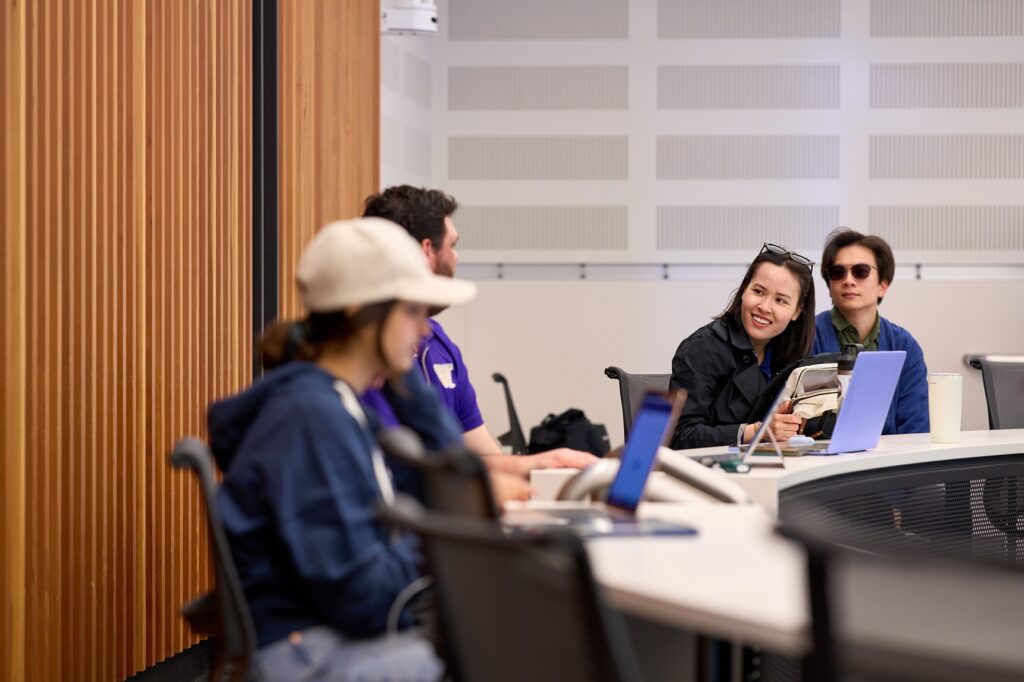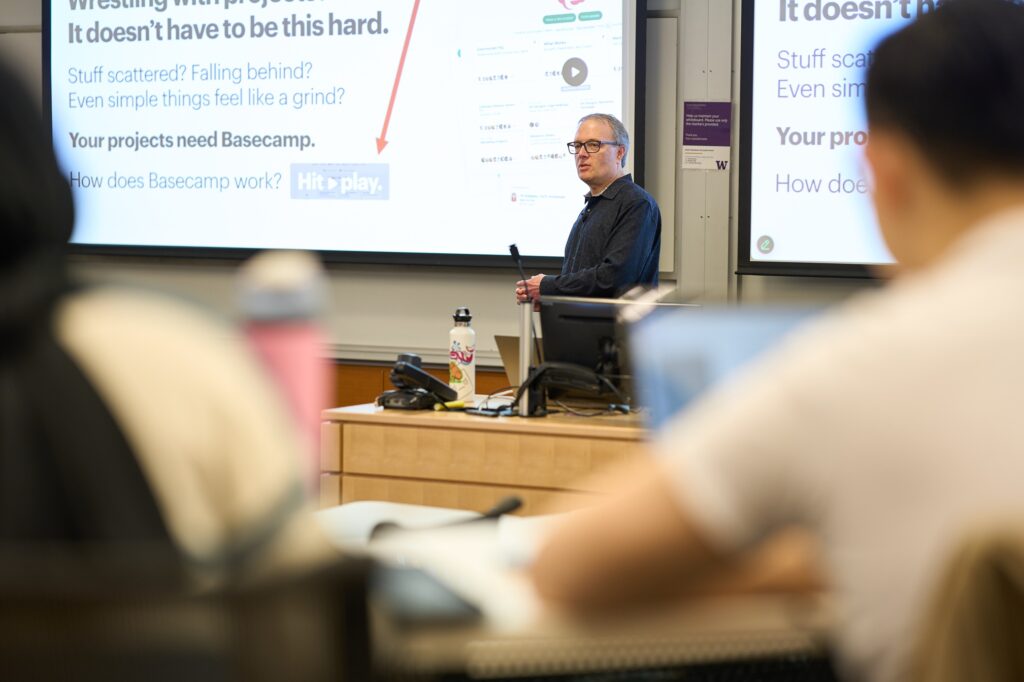Inside Foster’s Master of Science in Entrepreneurship
Ian Lurie helps aspiring entrepreneurs cut through the noise and get their message right.
If you’re building a business, Ian Lurie has one piece of advice: “Teach the hell out of everything.”
That’s the mindset he brings to the classroom in the Master of Science in Entrepreneurship at the Foster School of Business. It’s a one-year, full-time program designed to serve as the first year of a founder’s startup.
Lurie teaches aspiring entrepreneurs how to think strategically about content, marketing, and customer value. “Marketing is communication,” Lurie tells his students. “You’re answering: ‘What’s the problem?’ ‘How do I fix the problem?’ and ‘Do I have the best solution?'”
A digital marketing expert and company founder with over 30 years of experience, Lurie is an Affiliate Instructor of Marketing and International Business at Foster. His teaching philosophy is simple: if you want to build a business, you need to know how to explain it clearly, convincingly, and often.

More than marketing
Lurie’s class goes beyond tactics. Students learn to identify how their startup’s fit in the market, how to frame their offerings, and how to communicate their purpose through content. As he puts it, “I’m teaching how to figure out what to say in each of those steps, and how you track whether it’s working or not.”
That means aspiring entrepreneurs in the program aren’t learning generic marketing principles. They’re learning how to translate their vision into action. Lurie customizes his instruction to fit the needs of early-stage founders in industries as varied as beauty and skincare, travel and tourism, and technology.
His examples are accessible and practical: A bike tire retailer should offer tutorials on how to change a flat, and a sporting goods store should invite customers to share photos of themselves using the gear. Every touchpoint is a chance to add value.

Startup strategy, not textbook theory
The Entrepreneurship program is rigorous and specifically for founders. It’s equal parts graduate degree and startup incubator; an immersive year in which students build their businesses with the support of experienced faculty, accomplished mentors, and a community of peer entrepreneurs.
Lurie’s course is a key part of that experience. “If you already know what you want to build, this program gives you the tools to make it real,” he says.
Program alum Michael Spencer (MS 2025) puts it this way: “I’m taking this course because I desire to make a difference. The more knowledge I have, the more I’m able to serve others. The class is changing the way I think. Ian brings a unique perspective and challenges old assumptions. He’s dynamic, with a wealth of knowledge and real-world experience, but he is also relatable.”

From law school to digital strategy
Lurie didn’t set out to be a marketing expert. He holds a law degree from UCLA and jokes, “I went to law school and I loved it so much, I became a marketer the day I graduated.”
He became one of the earliest experts in digital strategy, founding Portent, an internet marketing agency that grew to more than 30 employees and served clients like Adidas, Fender Guitars, and Hitachi. Clearlink acquired Portent in 2017, and Lurie remained executive vice president for two more years.
Today, he consults with clients, including State Farm Insurance, and speaks at industry conferences and events. Consistent with his “teach everything” ethos, he offers much of his content for free on his website. “Most people don’t want to do their own marketing,” he says. “But if they do, I want them to do it well.”

Capybaras, clarity, and confidence
While his consulting work keeps him dialed into the real-world challenges of modern marketing, teaching remains the most rewarding part of Lurie’s career.
“Even as a professional, when I ran my agency, what I most enjoyed was teaching my team,” he says. “So getting to do it for a group of students who are there to learn is the best thing ever.”
Lurie’s classroom is lively, high-energy, and occasionally interrupted by a capybara. His presentation slides often feature the surprisingly charismatic rodent as a visual breather. “Every now and then, you’ll see one of the slides (with a capybara) pop up, and it’s a moment to take a breath, because this is very dense material. And I do love those animals!”
But beneath the humor is a serious commitment to helping student-founders sharpen their ideas and move from concept to clarity.

What founders really learn
For prospective students wondering what makes the Foster entrepreneurship program different, Lurie’s course offers a clear answer: the goal isn’t just to learn business theory. It’s to build real businesses, led by real founders, with real customers in mind.
“Good marketing hasn’t changed since people were throwing rocks at each other,” he says. “It’s all about a clear message communicated to ensure people are getting what they need, when they need it.”
At Foster, Lurie teaches students how to craft that message with precision, purpose, and confidence.
Learn more about the Master of Science in Entrepreneurship here.
